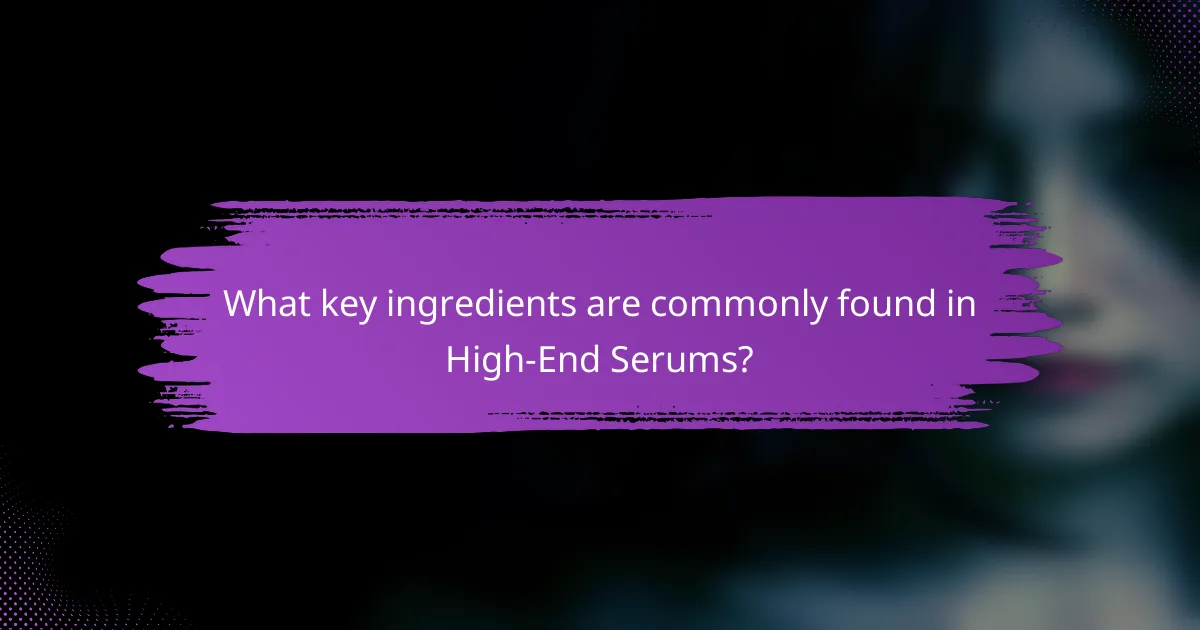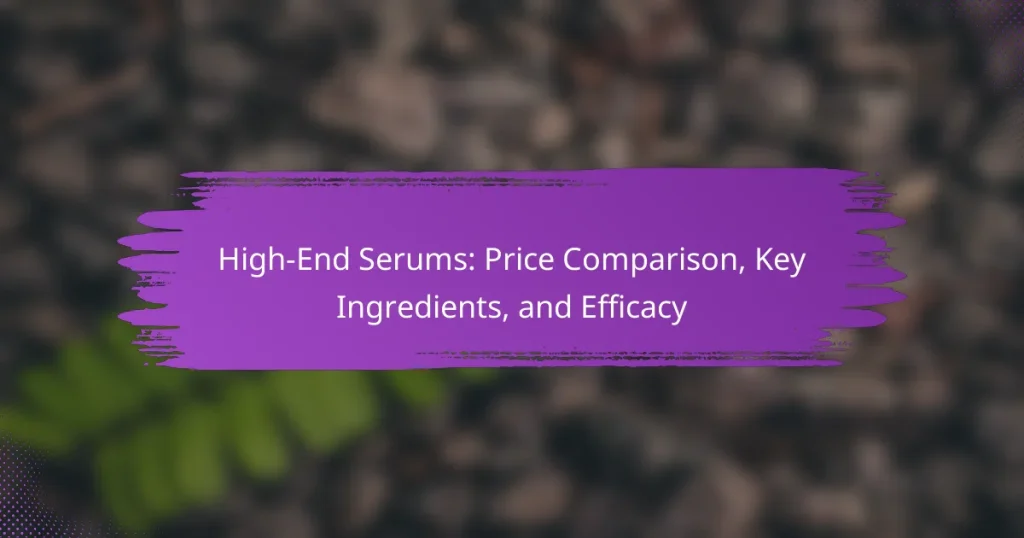High-end serums are premium skincare products formulated to deliver concentrated active ingredients that address specific skin concerns such as aging, hydration, and pigmentation. These serums often contain high-quality components like hyaluronic acid, vitamin C, retinol, peptides, and antioxidants, which enhance their efficacy and absorption. Clinical studies support the effectiveness of high-end serums, showing improvements in skin texture and appearance. This article explores the price comparison, key ingredients, and overall efficacy of high-end serums, highlighting their unique attributes and the visible results users can expect from consistent use.

What are High-End Serums?
High-end serums are premium skincare products designed to deliver concentrated active ingredients. They typically target specific skin concerns such as aging, hydration, or pigmentation. High-end serums often feature advanced formulations and higher-quality components compared to standard serums. These products may include unique attributes like rare botanical extracts or innovative technology. The efficacy of high-end serums is often backed by clinical studies or dermatological research. Users frequently report visible improvements in skin texture and appearance after consistent use. High-end serums usually come with a higher price point, reflecting their formulation and brand reputation.
How do High-End Serums differ from standard serums?
High-end serums differ from standard serums primarily in their formulation and ingredient quality. High-end serums often contain higher concentrations of active ingredients. These may include advanced peptides, antioxidants, and botanical extracts. Standard serums typically use more basic formulations with fewer active compounds.
Additionally, high-end serums often undergo more rigorous testing for efficacy and safety. They may also incorporate innovative technologies for better absorption. The price point of high-end serums reflects these enhanced formulations and research investments. For example, a study by the Journal of Cosmetic Dermatology found that serums with higher concentrations of active ingredients yielded better skin improvement results.
What unique attributes define High-End Serums?
High-end serums are defined by their premium ingredients, advanced formulations, and targeted efficacy. These serums often contain high concentrations of active ingredients like peptides, antioxidants, and vitamins. They typically utilize innovative delivery systems to enhance absorption and effectiveness. Many high-end serums are dermatologically tested and often backed by clinical studies. Their formulations are designed to address specific skin concerns such as aging, pigmentation, or hydration. The texture of high-end serums is usually lightweight and luxurious, providing a pleasant application experience. Additionally, they often come in sophisticated packaging that preserves the integrity of the ingredients. These attributes collectively contribute to their elevated price point and perceived value in the skincare market.
Why are High-End Serums considered premium products?
High-end serums are considered premium products due to their high-quality ingredients and advanced formulations. These serums often contain concentrated active ingredients, such as peptides, antioxidants, and hyaluronic acid, which are scientifically proven to deliver visible results. The manufacturing processes for these serums typically involve rigorous testing and high standards, ensuring efficacy and safety. Additionally, high-end brands invest in research and development to enhance product performance. The packaging of these serums also reflects their premium status, often featuring luxurious designs that appeal to consumers. Furthermore, the price point of high-end serums is generally higher, reflecting the quality and exclusivity of the product. This combination of quality ingredients, effective formulations, and premium branding contributes to their classification as luxury skincare items.
What are the main benefits of using High-End Serums?
High-end serums provide concentrated active ingredients that target specific skin concerns. These formulations often include higher-quality components, ensuring better absorption and effectiveness. High-end serums typically offer benefits such as enhanced hydration, improved skin texture, and reduced signs of aging. Many contain antioxidants that protect against environmental damage. Clinical studies show that serums with peptides can stimulate collagen production. This leads to firmer and more youthful skin. Additionally, high-end serums often undergo rigorous testing for safety and efficacy. This results in products that are less likely to cause irritation.
How do High-End Serums improve skin health?
High-end serums improve skin health by delivering concentrated active ingredients. These ingredients often include antioxidants, peptides, and hyaluronic acid. Antioxidants help protect skin from free radical damage. Peptides support collagen production, enhancing skin firmness. Hyaluronic acid provides deep hydration, reducing the appearance of fine lines. Clinical studies show that serums with these ingredients can significantly improve skin texture and tone. For instance, a study published in the Journal of Cosmetic Dermatology found that serums with vitamin C improved skin brightness after 12 weeks of use. Additionally, high-end serums often undergo rigorous testing for efficacy and safety, ensuring they deliver promised results.
What specific skin concerns can High-End Serums address?
High-end serums can address a variety of specific skin concerns. These include fine lines and wrinkles, uneven skin tone, and dryness. They also target dark spots, enlarged pores, and sagging skin. High-end serums often contain potent ingredients like peptides, hyaluronic acid, and antioxidants. For instance, serums with vitamin C can brighten the skin and reduce pigmentation. Research has shown that peptides can improve skin elasticity and firmness. Additionally, hyaluronic acid is effective for hydration and plumping the skin. These formulations provide concentrated solutions for specific issues, making them popular in skincare routines.
What factors influence the price of High-End Serums?
The price of high-end serums is influenced by several key factors. Ingredient quality is a primary determinant; premium ingredients often lead to higher costs. Formulation complexity also affects pricing; intricate formulations require more research and development. Brand reputation plays a significant role; established brands can command higher prices due to consumer trust. Packaging and marketing contribute to costs; luxurious packaging and extensive marketing campaigns increase the overall price. Additionally, production scale impacts pricing; smaller batches may be more expensive due to lower economies of scale. Finally, market demand influences prices; high demand for specific serums can drive prices up.
How do ingredient quality and sourcing affect pricing?
Ingredient quality and sourcing significantly affect pricing in high-end serums. High-quality ingredients often require more rigorous sourcing standards. For example, organic or sustainably sourced ingredients typically cost more due to limited availability. Additionally, rare ingredients can increase the price due to their unique properties and extraction methods. Sourcing from reputable suppliers adds to the cost, ensuring purity and efficacy. Studies show that consumers are willing to pay a premium for products with high-quality, ethically sourced ingredients. This willingness to invest in superior formulations drives up the overall pricing of high-end serums.
What role does brand reputation play in serum pricing?
Brand reputation significantly influences serum pricing. A well-established brand often commands higher prices due to perceived quality and trustworthiness. Consumers associate reputable brands with consistent efficacy and safety, leading to a willingness to pay more. Studies show that brands with strong reputations can charge up to 20% more than lesser-known competitors. This premium pricing reflects the brand’s investment in research, quality ingredients, and marketing. Additionally, positive reviews and endorsements enhance brand reputation, further justifying higher prices. Thus, brand reputation is a critical factor in determining serum pricing in the high-end market.

What key ingredients are commonly found in High-End Serums?
High-end serums commonly contain ingredients like hyaluronic acid, vitamin C, retinol, peptides, and antioxidants. Hyaluronic acid is known for its ability to retain moisture, providing hydration to the skin. Vitamin C is a powerful antioxidant that helps brighten the complexion and reduce signs of aging. Retinol promotes cell turnover, improving skin texture and reducing wrinkles. Peptides support skin elasticity and firmness by stimulating collagen production. Antioxidants protect the skin from environmental damage and free radicals. These ingredients are favored for their efficacy in delivering visible results in skincare.
Which active ingredients are known for their efficacy?
Active ingredients known for their efficacy include hyaluronic acid, vitamin C, and retinol. Hyaluronic acid is renowned for its ability to retain moisture, providing hydration and plumpness to the skin. Vitamin C is a powerful antioxidant that helps brighten the skin and reduce signs of aging. Retinol is effective in promoting cell turnover and improving skin texture. Studies have shown that these ingredients can lead to significant improvements in skin appearance and health. For instance, a study published in the Journal of Cosmetic Dermatology found that retinol can reduce fine lines and wrinkles by up to 45% over a 12-week period.
What benefits do hyaluronic acid and vitamin C provide?
Hyaluronic acid provides intense hydration and helps retain moisture in the skin. It can hold up to 1000 times its weight in water. This property makes it effective for plumping and reducing the appearance of fine lines. Vitamin C, on the other hand, is a powerful antioxidant. It protects the skin from free radical damage and promotes collagen production. This helps improve skin elasticity and firmness. Together, hyaluronic acid and vitamin C enhance skin hydration and brightness. Studies show that vitamin C can also reduce hyperpigmentation and even skin tone.
How do peptides contribute to skin rejuvenation?
Peptides contribute to skin rejuvenation by stimulating collagen production and enhancing skin elasticity. They are short chains of amino acids that serve as building blocks for proteins in the skin. Increased collagen levels lead to firmer and more youthful skin. Peptides also promote cellular repair and regeneration, which helps reduce the appearance of fine lines and wrinkles. Studies show that topical application of peptides can significantly improve skin texture and hydration. For example, a study published in the Journal of Cosmetic Dermatology found that peptides enhanced skin hydration by 30% after eight weeks of use.
How can consumers identify high-quality ingredients in serums?
Consumers can identify high-quality ingredients in serums by examining the ingredient list closely. High-quality serums often feature active ingredients like hyaluronic acid, vitamin C, and peptides. These ingredients are known for their effectiveness in skin hydration, brightening, and anti-aging. Consumers should look for serums with a high concentration of these actives, typically listed near the top of the ingredient list. Additionally, the absence of harmful additives such as parabens and sulfates is a good indicator of quality. Research shows that products with fewer synthetic ingredients tend to be better tolerated by the skin. Furthermore, consumers can check for clinical studies or dermatologist recommendations that support the efficacy of the serum’s ingredients.
What certifications or labels should consumers look for?
Consumers should look for certifications such as USDA Organic, Non-GMO Project Verified, and Cruelty-Free. These certifications indicate that the products meet specific quality and ethical standards. USDA Organic ensures that ingredients are grown without synthetic fertilizers or pesticides. Non-GMO Project Verified confirms that the product does not contain genetically modified organisms. Cruelty-Free labels indicate that the product was not tested on animals. Additionally, consumers may seek products with dermatologist-tested or hypoallergenic labels for skin safety assurance. These certifications help consumers make informed choices about the efficacy and ethics of high-end serums.
How do ingredient concentrations impact serum effectiveness?
Ingredient concentrations directly influence serum effectiveness. Higher concentrations of active ingredients typically enhance the serum’s potency. This leads to improved absorption and efficacy in delivering desired results. For instance, a vitamin C serum with a concentration of 15% can provide more significant antioxidant benefits compared to one with 5%. Studies show that optimal concentrations can vary for different ingredients. For example, hyaluronic acid is often effective at 1-2%, while retinol is more active at 0.5-1%. Therefore, understanding the specific concentration required for each ingredient is crucial for maximizing serum performance.

How effective are High-End Serums?
High-end serums are generally effective due to their concentrated formulations and premium ingredients. These serums often contain active compounds like peptides, antioxidants, and hyaluronic acid. Such ingredients target specific skin concerns, including aging, hydration, and uneven tone. Clinical studies show that high-end serums can improve skin texture and elasticity. For example, a study published in the Journal of Cosmetic Dermatology found that serums with vitamin C improved skin brightness in 80% of participants. Additionally, the use of high-quality ingredients can lead to better absorption and results compared to lower-priced alternatives.
What scientific evidence supports the efficacy of High-End Serums?
High-end serums have been shown to be effective through various scientific studies. Research indicates that ingredients commonly found in high-end serums, such as hyaluronic acid and vitamin C, have proven benefits for skin hydration and brightening. A study published in the Journal of Cosmetic Dermatology found that hyaluronic acid significantly improves skin hydration levels after topical application. Another study in the Dermatologic Surgery journal demonstrated that vitamin C can enhance collagen synthesis, leading to improved skin texture. Furthermore, a systematic review in the International Journal of Dermatology highlighted the positive effects of peptides in high-end serums on skin elasticity and firmness. These findings collectively support the efficacy of high-end serums in enhancing skin health and appearance.
What do clinical studies reveal about their performance?
Clinical studies reveal that high-end serums often demonstrate significant efficacy in improving skin conditions. Research indicates that these serums can enhance hydration, reduce fine lines, and improve skin texture. For instance, a study published in the Journal of Cosmetic Dermatology found that serums containing hyaluronic acid increased skin hydration by 30% after four weeks of use. Another clinical trial showed that vitamin C serums reduced hyperpigmentation by 50% in participants over a 12-week period. These findings confirm the performance of high-end serums in delivering visible skin improvements.
How do consumer reviews reflect the effectiveness of these products?
Consumer reviews reflect the effectiveness of high-end serums by providing firsthand experiences from users. These reviews often detail specific results, such as improvements in skin texture or hydration levels. Many consumers share before-and-after photos, which visually demonstrate the serum’s impact. Additionally, reviews frequently mention the speed of results, indicating how quickly users noticed changes. Patterns in feedback can highlight common benefits, such as reduced fine lines or enhanced glow. Statistical analysis of reviews can reveal average ratings, further supporting claims of effectiveness. Overall, consumer reviews serve as a valuable resource for gauging the real-world performance of these products.
What are the best practices for using High-End Serums?
Apply high-end serums after cleansing and toning your skin. This ensures maximum absorption of active ingredients. Use a small amount, typically a pea-sized amount is sufficient. Gently massage the serum into your skin using upward motions. Allow the serum to fully absorb before applying moisturizer or sunscreen. For optimal results, use serums consistently, ideally twice daily. Store serums in a cool, dark place to maintain their efficacy. Always patch test new serums to avoid adverse reactions. Choose serums based on specific skin concerns, such as hydration or anti-aging.
How should High-End Serums be incorporated into a skincare routine?
High-end serums should be incorporated into a skincare routine after cleansing and toning. Apply a small amount of serum to clean, dry skin. Gently pat the serum onto the face and neck for better absorption. Follow with a moisturizer to lock in the serum’s benefits. Using high-end serums consistently can enhance skin texture and hydration. Studies show that serums with active ingredients can improve skin conditions effectively. For optimal results, use serums tailored to specific skin concerns, such as anti-aging or brightening.
What common mistakes should users avoid when using serums?
Users should avoid applying serums on dirty skin. Clean skin allows for better absorption of active ingredients. Another common mistake is using too much product. A small amount is typically sufficient for effective results. Users often forget to layer serums properly. Applying in the correct order enhances efficacy. Additionally, some users skip sunscreen after serum application. Sunscreen protects the skin from UV damage. Lastly, users may not give serums enough time to work. Consistent use over weeks is necessary for visible results.
High-end serums are premium skincare products formulated with concentrated active ingredients to address specific skin concerns such as aging, hydration, and pigmentation. This article provides a comprehensive overview of high-end serums, including their unique attributes, benefits, and the key ingredients commonly found in these products, such as hyaluronic acid, vitamin C, and peptides. It also explores factors influencing their pricing, the scientific evidence supporting their efficacy, and best practices for incorporating them into skincare routines. By understanding these elements, consumers can make informed decisions about high-end serums and their potential impact on skin health.


